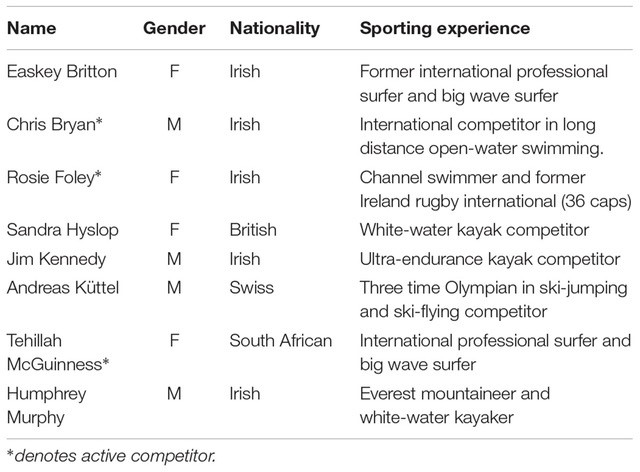“We are like islands in the sea, separate on the surface but connected in the deep.” William James
The concept of ‘Blue Mind’ coined by ocean scientist Wallace J. Nichols (2014) which has popularized water-based activities as a pathway to well-being and health provides a fitting backdrop for our publication. Blue mind refers to a “mildly meditative state characterized by calm, peace, unity and a sense of general happiness and satisfaction with life in the moment” (p.6). Researchers have been concerned with the impact of being close to water on different scales. For example, Blue Health2020 is a pan-European research project investigating the links between environment, climate and health with a specific focus on blue-natural spaces (Grellier et al., 2017). However, few studies had, to date, explored the lived experiences of those who were highly active in sport and adventure in blue natural spaces. Thus, this study focused on the voice of the participants in extreme water sports and also included mountaineering and ski-flying competitors for a green exercise contrast.
We present the cases of eight athletes (See Table below ) taking places in blue-environments, such as long-distance open water swimming (e.g. English Channel), white-water and ultra-endurance kayaking and big wave surfing. Semi-structured interviews were conducted and we summarized the central themes that emerged from in-depth interviews with each of the participants.

Their retrospective accounts conveyed commonalities in their resilient mindsets, their connectivity with nature and positive attitudes toward the environment. Their differences paled in significance relative to their overlapping values, goals and responses to interacting with nature in the context of extreme sports.
A unique aspect of the study is that participants were not simply extreme sport participants but many had extensive experience which was relevant to the study. For example, PESS doctoral student Chris Bryan, a former open-water swimmer, researches psychological resilience, and sport psychologist Dr Andreas Kuttel is a lecturer on dual career transitions. Similarly, Humphrey Murphy is a consultant on the development of the Blueways and Dr Easkey Britton is a marine social scientist working on the EU funded ocean and health project. Interestingly, while this would be considered a potential bias in a quantitative study, from a qualitative viewpoint it simply demonstrates the rich and detailed participant experiences that we are trying to reveal.
The challenge of conducting qualitative interviews for this study has already been outlined in a PESS blog by graduate Greig Oliver. A more extensive version of these findings appears in two chapters, one focusing on blue exercise and another on green exercise in A. A. Donnelly and T. E. MacIntyre Physical Activity in Natural Settings: Blue Mind and Green Exercise (Routledge, In Press).
UL is well placed to conduct research on human nature-interactions. Just 20km upstream is the Lough Derg Blueway, a series of bespoke multi-recreational trails on Ireland’s third largest lake over 40km miles in length totaling 130 square kilometres. Waterways Ireland are investing in evidence-based approaches to evaluate the benefits of Blueways, not simply for tourism, but for well-being and health of our communities. The 133 hectare University of Limerick campus, dissected by the river Shannon, provides us all with an accessible pathway to the blue natural spaces. In our view, it would be a major oversight to ignore it and this formed part of the motivation for our exploratory research-Andree Walkin, a triathlete and kayaker and Greig Oliver, both turn to the outdoors as a psychological resource. Interviewee, PESS graduate and member of the UL Sports Hall of Fame, Rosie Foley gave an example that brought the power of nature home: “When I’m swimming I can cry… it’s me on my own and it’s fine and I’m not upsetting anyone else …that’s how it helps me cope.” From the
English Channel to the top of Everest the nature of the challenge can change but the natural world still arouses a complex rich response among extreme sport performers.
Thanks to funding from Waterways Ireland Heritage Grant awarded to the first author which funded the cost of open access publication with co-funding from the PESS Department.
 Please cite as: MacIntyre, T. E., Walkin, M., Beckmann, J., Calogiuri, G., Gritzka, S., Oliver, G., Donnelly, A. A. & Warrington, G. (2019) An Exploratory Study of Extreme Sport Athletes’ Nature Interactions: From Well-Being to Pro-environmental Behavior. Front. Psychololgy, 10, 1233. doi: 10.3389/fpsyg.2019.01233
Please cite as: MacIntyre, T. E., Walkin, M., Beckmann, J., Calogiuri, G., Gritzka, S., Oliver, G., Donnelly, A. A. & Warrington, G. (2019) An Exploratory Study of Extreme Sport Athletes’ Nature Interactions: From Well-Being to Pro-environmental Behavior. Front. Psychololgy, 10, 1233. doi: 10.3389/fpsyg.2019.01233
 Dr. Tadhg MacIntyre (tadhg.macintyre@ul.ie) leads the GO GREEN EX initiative at PESS and the Health Research Institute, University of Limerick, and is an expert advisor to the Re-Nature H2020 project on nature based solutions.
Dr. Tadhg MacIntyre (tadhg.macintyre@ul.ie) leads the GO GREEN EX initiative at PESS and the Health Research Institute, University of Limerick, and is an expert advisor to the Re-Nature H2020 project on nature based solutions.

